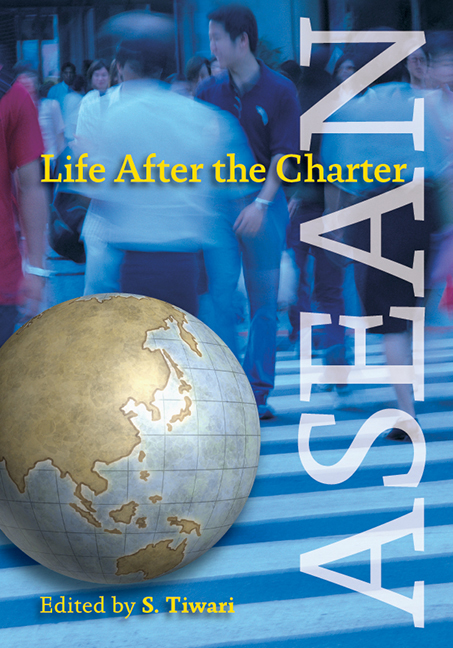Book contents
- Frontmatter
- Contents
- Foreword
- Preface
- List of Contributors
- Introduction
- 1 ASEAN Legal Personality under Its New Charter – Its Nature, Meaning and Implications: Status of the Work and Issues Involved
- 2 Does ASEAN Exist? The Association of Southeast Asian Nations as an International Legal Person
- 3 Life in ASEAN After the Entry into Force of the ASEAN Charter: Implications and Follow-ups
- 4 Translating the Design into a Bloc: The Domestic Implementation of the ASEAN Charter
- 5 ASEAN Trade in Goods Agreement (ATIGA)
- 6 The ASEAN Comprehensive Investment Agreement 2009: Its Objectives, Plans and Progress
- PRIVATE SECTOR PERSPECTIVES
- 7 The ASEAN Charter and the ASEAN Economic Community: A Watershed for Regional Economic Integration?
- 8 Implications of an Uncertain Global Economy on Integration Initiatives
- 9 Challenges to Achieving the ASEAN Economic Community
- 10 ASEAN: An Integrated Market?
- 11 A Miscellany of Trade Issues
- 12 Policy Issues for ASEAN Countries
- Index
11 - A Miscellany of Trade Issues
from PRIVATE SECTOR PERSPECTIVES
Published online by Cambridge University Press: 21 October 2015
- Frontmatter
- Contents
- Foreword
- Preface
- List of Contributors
- Introduction
- 1 ASEAN Legal Personality under Its New Charter – Its Nature, Meaning and Implications: Status of the Work and Issues Involved
- 2 Does ASEAN Exist? The Association of Southeast Asian Nations as an International Legal Person
- 3 Life in ASEAN After the Entry into Force of the ASEAN Charter: Implications and Follow-ups
- 4 Translating the Design into a Bloc: The Domestic Implementation of the ASEAN Charter
- 5 ASEAN Trade in Goods Agreement (ATIGA)
- 6 The ASEAN Comprehensive Investment Agreement 2009: Its Objectives, Plans and Progress
- PRIVATE SECTOR PERSPECTIVES
- 7 The ASEAN Charter and the ASEAN Economic Community: A Watershed for Regional Economic Integration?
- 8 Implications of an Uncertain Global Economy on Integration Initiatives
- 9 Challenges to Achieving the ASEAN Economic Community
- 10 ASEAN: An Integrated Market?
- 11 A Miscellany of Trade Issues
- 12 Policy Issues for ASEAN Countries
- Index
Summary
The business-sector presentations were followed by views expressed by business personalities, ASEAN officials and those from thinktanks specializing in ASEAN issues.
NON-TARIFF BARRIERS (NTBS)
It was agreed that the deadline of five years for the removal of non-tariff barriers in ATIGA was “unrealistic”. It was “more of a paper assessment” but had to be retained in ATIGA as a commitment. NTBs were a “moving target” and therefore had to be eliminated on a continuous basis. It was generally felt that some non-tariff measures were necessary and accordingly it was best to adopt a “measured approach” and target “barrier components” of these measures for elimination. ASEAN planned to issue guidelines on how to implement non-tariff measures such as import licensing procedures.
ATIGA sought to eliminate NTBs through trade facilitation. Measures such as the harmonized tariff nomenclatures, the ASEAN window, et cetera, were attempts towards making progress although they were not fully operational yet.
THE RESPONSIBILITY OF THE PRIVATE SECTOR
ASEAN Secretariat officials felt that the private sector needed to take a keener interest in ASEAN. It needed to keep abreast of ASEAN developments and “prod” the public sector.
ASEAN was considering the possibility of obtaining privatesector inputs on NTBs through a joint consultative committee on trade facilitation. It was hoped that the private sector would speak up. It was mentioned that the private sector's common excuse was that they had the “right to remain silent”.
THE ISSUE OF CORRUPTION
A participant observed that the likely reason for the business people's reluctance to voice concerns was that they were “scared of retaliation” from certain authorities. He added that no one had raised the issue of corruption as a non-tariff barrier. One of the private-sector commentators felt that the silence on corruption was a manifestation of the ASEAN tendency to “keep things comfortable”. He added that a survey of ASEAN businesses, across all sectors, had been carried out to determine their concerns and their perceptions in relation to non-tariff measures. However, this study had never been released, since it highlighted the issue of corruption in ASEAN.
- Type
- Chapter
- Information
- ASEANLife after the Charter, pp. 145 - 148Publisher: ISEAS–Yusof Ishak InstitutePrint publication year: 2010



